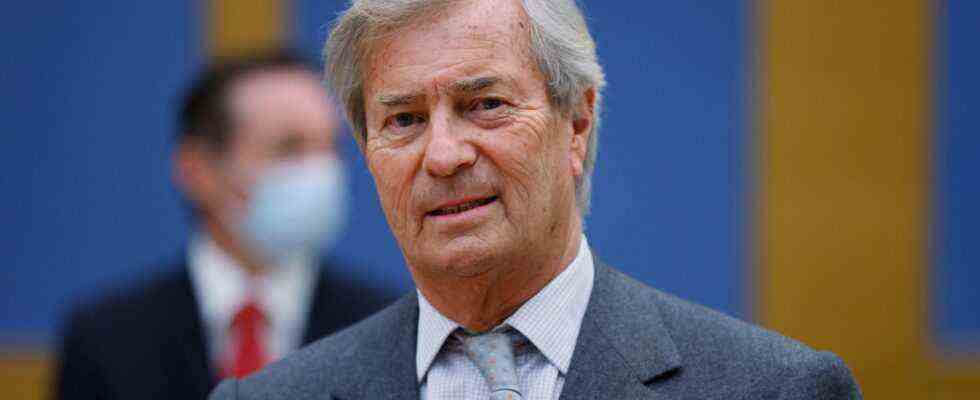Status: 01/29/2022 03:34 a.m
The right-wing hardliner Zemmour has Vincent Bolloré to thank for the fact that he is making such a fuss in the French election campaign: With his media group, he shapes reporting and silences critics.
From the noble pen at the daily newspaper “Le Figaro” to the controversial television commentator – and then to the celebrated presidential candidate: The right-wing hardliner Eric Zemmour has had a meteoric career. Vincent Bolloré made it possible. The ruler of an international industrial group not only owns numerous logistics and transport companies, but has also been investing heavily in the media for several years. He is the main shareholder of the Vivendi media group, holds 18 percent of Universal Music and, in addition to numerous TV stations and newspapers, has now also incorporated the largest private radio station Europe 1 just in time for the presidential election. Bolloré is said to have helped Zemmour create the evening debate format on one of his channels – CNews.
The billionaire Breton is considered arch-conservative, deeply Catholic and patriotic. This fits with Zemmour’s narrative that France’s civilization is on the brink of being wiped out by Islam. So did Bolloré install Zemmour at CNews to use his media power in the election campaign for the far right?
“Bolloré is waiting for someone to break in”
The billionaire says modestly that his influence is overestimated. In mid-January, Bolloré told a Senate commission concerned with the independence of the media in France: “As a shareholder, I don’t have the power to nominate anyone within the broadcasters.” His chances of getting something done are not very great: “I can suggest something, give my opinion. I can say: ‘Don’t think that…’ But if the person doesn’t feel like it, then they just don’t do it.”
You can see it differently: After Bolloré took over CNews, three quarters of the journalists left in protest, and the radio station Europa 1, which he turned right side out, is currently experiencing an exodus. The journalist Jean-Batiste Rivoire says Bolloré’s influence is immense and his approach brutal: “What’s really shocking is that he practices censorship. He terrorizes the employees, he suppresses investigative projects, he just doesn’t want too much journalism. He wants use journalism to make propaganda for his business or for the politicians he supports.”
Rivoire experienced this first hand. As deputy director of the program “Special Investigation” at the pay channel Canal +, of which Bolloré was the main shareholder, In 2015 he did research on a subsidiary of Crédit Mutuel, which is said to have been involved in money laundering. Rivoire alleges that Bolloré prevented the publication for personal and business reasons. The billionaire initially fired him and, when that was not legally possible, wanted to get rid of him with a severance payment including a non-disclosure clause. “I was then on the sidelines, sidelined, in my office for four years without any assignment,” says Rivoire. “Bolloré is waiting for someone to break in.”
“Even if he loses, he wins”
Or he goes to court. Numerous journalists have already had to endure years of lawsuits because Bolloré has sued them for defamation and character assassination. He demanded 50 million euros in damages from the public broadcaster France 2 for the broadcast of an award-winning documentary with the suggestive title: “Vincent Bolloré, a friend who wishes you good?” Bolloré did not file his complaint with the criminal court, but with the commercial court. The argument: the reporting harms his group.
The author of the documentary, Tristan Waleckx, was in court five times because of Bolloré’s lawsuits, and the journalist won five times. In a report for Reporters Without Borders, Waleckx says of Bolloré: “If his goal had really been to win, he would have prepared it all legally a bit more solidly. He almost always loses, but even when he loses he actually wins. Because he steals your time, costs you money – and above all he deters others from researching him.”
Politics hardly goes against him
For reasons: he has already been convicted of corruption in connection with port licenses in West Africa. The problem is not only the size and power of his media company Vivendi. Also and above all the fact that as an industrialist he repeatedly gets into conflicts of interest with the free press of which he is a major shareholder makes Bolloré so dangerous for democracy, says the journalist Rivoire – and gives an example:
In 2017, Bolloré wanted to sign a contract with the ruler of Togo – at the same time Canal+ broadcast a report on demonstrations by the Togolese people. “The dictator then had the crowd shot at. Everyone knew that, you could see it on the BBC! But Bolloré wanted to sign a contract with this dictator,” Rivoire criticized. “And what does he do? He makes sure that the post is no longer repeated on the homepage. We’re not allowed to show it anymore.”
Right-wing populist Eric Zemmour is full of praise for Bolloré: He shares his fears of an alleged population exchange in France, he says – “I think that’s noble.”
Image: REUTERS
Right-wing presidential candidate Eric Zemmour sees his sponsor in a completely different light: “There are other wealthy people who just count their money and then disappear abroad. I prefer the patriot who wants to defend his country. I pay him my respects.” , he says.
Despite increasing coverage of Bolloré’s influence and role in the election campaign in recent weeks, and despite the Senate subpoenaing Bolloré, there is little evidence that politics will effectively curtail his power anytime soon. Because Bolloré can also do a lot of harm to Zemmours’ competitors in the future – or be very useful.
The media power of Vincent Bolloré
Julia Borutta, ARD Paris, 28.1.2022 1:48 p.m

